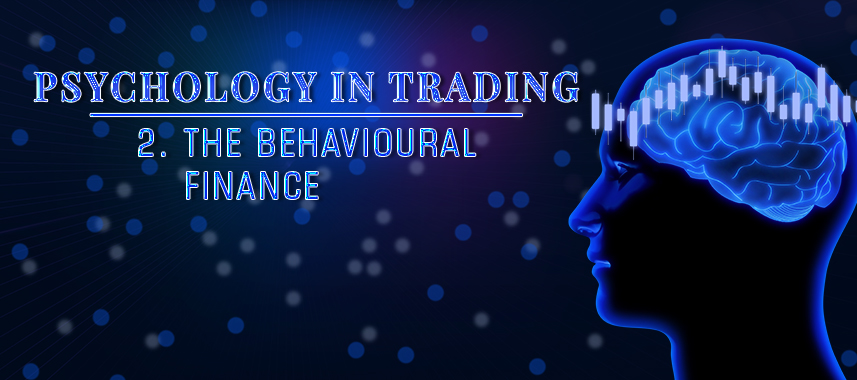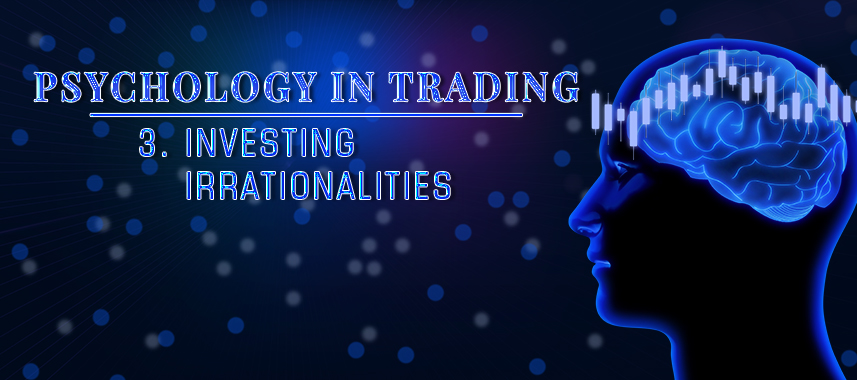
Herd-Behaviour
4 January 2023
Equity Premium Puzzle
4 January 2023When things go wrong, you feel regret; you look for excuses to prevent your decision from actually being wrong. On the other end, when profits are concerned, you grow proud, especially if you are at the beginning of your business, and this causes overconfidence and an overestimation of your skills.
When your confidence increases, something which often happens after closing several trades in profit, your self-esteem can reach very high levels, to the point that you are sure you can anticipate future market movements. You are convinced that your view, which is nothing more than an opinion, will actually turn into reality.
You would overestimate your skills and, most likely, you would start working without discipline. You would be so convinced that your opinion would turn into reality, that you would let all your losses run, believing that the market, in the end, would do what you expected all along.
Often, when the market moves against your expectations, you are convinced that everyone else is crazy and incompetent because they are doing the opposite of what you think. As much as these opinions may be reasonable, they still remain opinions, which cannot be traded (another concept you will see explained before the end of this book).
This sentiment, then, would lead you to do things that you would never do after applying a minimum of rational thought. You will feel like the market master, and you will be driven to take crazy risks that in a phase with a little more experience, with a bit more rationality, you would never do.
So, do not grab a bigger bite than you can actually chew. The super trader syndrome is a weakness common to many traders, and those who know me know that the first few times I traded, it also happened to me. When things initially go well, due to the so-called “beginners’ luck,” you should never think that the battle has been won, or the market defeated.
To trade with the sole purpose of earning is not enough; you always have to think precisely about what you are doing. Otherwise, you risk casually investing the gain you got into other markets.
This is because, if you begin to feel like you are the master of the market, which may well happen (as it once did to me), despite what you might earn, even with a bit of luck, you will still lose a lot more by feeling this way.
Beware of feeling too confident in claiming you have all the right information, the best trade, or even that the markets keep no secrets from you. No. You must always look for the middle way
Do not get down on yourself after the first loss, and you most certainly shouldn’t feel regret after a bad trade, because this is part of a trader’s job. There will be losses, and you have to learn to accept them without any drama.
At the same time, you should not become hyper-confident just because some of your trades closed in profit, because you may have won a small battle, but there is still a long way to go.
Another aspect of being overly confident or too proud is that, very often, when you have gotten a profit, you attribute a different value to this money than when you first invested it.
For example, say you had $ 20,000 in your trading account. You earn $1,500, and with this money, you become more aggressive. That is, you say: “Well, I have now earned $ 1,500, and with this money, I can become more aggressive in my strategies since I have gotten a profit.” As if that money were not your own.
Looking at the money you gain in this way is, in my opinion, a mistake, and I am the first to say that I did this in the past myself. Many traders tend to be less careful with the money they earn than the money they originally invested. The fact that you have made money with a good trade does not mean that you should increase the risks you take with that money.
Many people, instead, are often willing to run more risk with money they perceive as earned as if they had found that money by chance. But if you waste this money because you have a lower consideration for it, then you risk getting in trouble when you start making losses.
So, all this shows that it makes no sense to increase your risk profile when gaining money; it should always stay the same. The money you invest should have an equal value to the money you earn. Doing the opposite of this means making an irrational mistake, but nevertheless, you will often be inclined to do it anyway.
So, never forget: always respect your money, no matter how you have gotten it.
Overconfidence vs Lack of Confidence
Confidence refers to a strong sense of belief and trust in your abilities to achieve what you want in life. The benefits of having greater self-confidence are numerous, As they allow you to have more faith in the decision you take in life. Having a lack of confidence can prove to be an obstacle to achieving more in your life, but being over-confident should also be avoided.
Whether you feel that you have sufficient self-confidence, or that you have room for improvement, do keep in mind that the key is in striking a balance between your level of confidence, and the life path that you are charting.
If these two do not complement each other, you may find that a lack of confidence will hinder you from staying on track, whilst over-confidence may prove to be your downfall.
Confident people are able to determine what they are doing in life and reach for it with enthusiasm, knowing and placing faith in their strengths and skills to achieve it. Many people seek to improve their self-confidence, but it is necessary to draw a line between being confident and over-confident.
Overconfidence can work against what you are aiming for, blinding you to your own comparative advantages or preventing you from accurately determining if the position you are in is where you desire to be.
Overconfidence also works against you when you are faced with failures or obstacles that you strongly felt should have been straightforward and easily achievable.
This results in anger and impulsive behaviour, and you may end up souring relationships with your colleagues and close friends. Often, over-confident people are unaware that they have overreacted. This makes it even more difficult for them to identify when they are over-confident.
A few likely signs that you are over-confident is if you tend to be overly assertive and feel that you are superior to others. You might also find that your friends or others keep a distance from you, or act somewhat cool towards you.
If you suspect that you might be over-confident, well done, this is a signal that you are humble enough to deal with your confidence problems.
Maintaining pride and confidence when doing tasks or forming opinions actually comes in second to logic and analysis. Do not let your confidence cause you to let your guard down, or put in less effort than you should be putting into your work.
Thus, while being confident is desirable, be careful not to over-rely on your self-confidence or use it as a reason to procrastinate or to cut down on your preparation work.
The over-confidence effect is not limited to laboratory situations but has been demonstrated in many areas of professional life, such as investment banking, clinical psychology, medicine and others.
Unwarranted confidence in one’s own knowledge and competence can yield to reckless behaviour and lack of openness for disconfirming information, which therefore leads to poor performance and severe mistakes.
On the other hand, displaying high levels of confidence can also be beneficial for two reasons. First, competence cannot always be measured. Therefore, others might not find out that a confident person is actually over-confident.
Second, over-confidence in one’s competence encourages actions that one would not undertake if one were less confident, but which may nevertheless be successful.
When profits are concerned, you grow proud, especially if you are at the beginning of your business, and this causes overconfidence and an overestimation of your skills. When your confidence increases
I am a macroeconomic and financial analyst with over 30 years’ experience, including two years as a fund manager. I specialise in currencies and commodities, and I am the author of several successful books on trading, macroeconomics, and financial markets.






